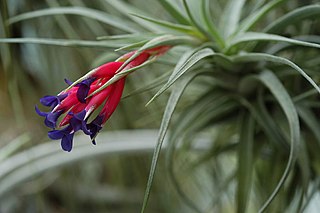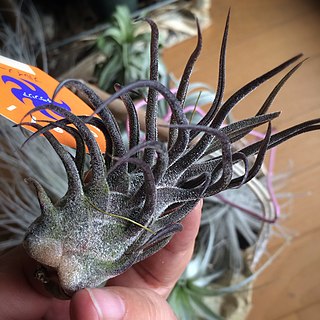
The Bromeliaceae is a family of monocot flowering plants of 75 genera and around 3590 known species native mainly to the tropical Americas, with a few species found in the American subtropics and one in tropical west Africa, Pitcairnia feliciana.

Spanish moss is an epiphytic flowering plant that often grows upon large trees in tropical and subtropical climates. It is native to much of Mexico, Bermuda, the Bahamas, Central America, South America, the Southern United States, West Indies. It has been naturalized in Queensland (Australia). It is known as "grandpas beard" in French Polynesia.

Tillandsia is a genus of around 650 species of evergreen, perennial flowering plants in the family Bromeliaceae, native to the forests, mountains and deserts of northern Mexico and south-eastern United States, Mesoamerica and the Caribbean to mid Argentina. Their leaves, more or less silvery in color, are covered with specialized cells (trichomes) capable of rapidly absorbing water that gathers on them.

Tillandsia recurvata, commonly known as small ballmoss or ball moss, is a flowering plant in the family Bromeliaceae that grows upon larger host plants. It grows well in areas with low light, little airflow, and high humidity, which is commonly provided by southern shade trees, often the southern live oak. It is not a parasite like mistletoe, but an epiphyte like its relative Spanish moss.
Pouteria izabalensis is a species of plant in the family Sapotaceae. It is found in Belize, Guatemala, Honduras, and Nicaragua.

Tillandsia caput-medusae is a species of flowering plant in the bromeliad family, Bromeliaceae, subfamily Tillandsioideae. Common names include octopus plant and medusa's head. An epiphyte native to Central America and Mexico, T. caput-medusae is a commonly cultivated bromeliad species. The thick, channeled, tapering and twisting leaves are up to 25 cm (9.8 in) long and are covered in fine gray hairs. The rosette of leaves arise from an inflated pseudobulb. Pups are produced after blooming, as is usual with most Tillandsia species.

Tillandsia aeranthos is a species of plant in the genus Tillandsia. This species is native to southern Brazil, Paraguay, Uruguay, and Argentina.

Tillandsia balbisiana, common name northern needleleaf, is a species of bromeliad in the genus Tillandsia. This species in native to Mexico, Central America, Colombia, Venezuela, the West Indies, and Florida.

Tillandsia bulbosa, the bulbous airplant, is a species in the genus Tillandsia. It is widespread across Central America, the West Indies, southern Mexico, and northern and eastern South America.
Tillandsia capitata is a species in the genus Tillandsia. It is native to Mexico, Honduras, Cuba and the Dominican Republic.

Tillandsia brachycaulos is a species in the genus Tillandsia. It is native to Mexico, Central America, and Venezuela.

Tillandsia pruinosa, is a species of flowering plant in the Bromeliaceae family. It is commonly known as the fuzzywuzzy airplant. This species is native to northern South America, Central America, southern Mexico, the West Indies and Florida.

Tillandsia stricta is a species in the genus Tillandsia. This species is native to South America and Trinidad.

Tillandsia tenuifolia, the narrowleaf airplant, is a species in the genus Tillandsia. This species is widespread across much of South America and the Caribbean islands.

Tillandsia fasciculata, commonly known as the giant airplant or cardinal airplant, is a species of bromeliad that is native to Central America, Mexico, the West Indies, northern South America, and the southeastern United States. Within the United States, this airplant is at risk of extirpation from the Mexican bromeliad weevil, Metamasius callizona.

Tillandsia flabellata is a species of flowering plant in the Bromeliaceae family. This species is native to southern Mexico and Central America.

Tillandsia ionantha, the air plant, is a species in the genus Tillandsia. This species is native to Central America and Mexico. It is also reportedly naturalized in Broward County, Florida.

Tillandsia streptophylla is a species in the genus Tillandsia. This species is native to Central America, Mexico, and the West Indies.
Tillandsia rectangula is a plant species of flowering plant in the Bromeliaceae family. This species is native to Bolivia and Argentina. Tillandsia rectangula was described and the name validly published by John Gilbert Baker in 1878. Tillandsia rectangula is a species in the genus Tillandsia which contains between 713 and 777 species and belongs to the family of the Bromeliaceae. The type species of the genus is Tillandsia utriculata. The perennials prefer a sunny situation on fresh to moist soil. They tolerate temperatures only above at least 1 °C.The plants are suited for cultivation in a temperate house.

Tillandsia latifolia is a species in the genus Tillandsia. This species is native to Ecuador and Peru. Four varieties are recognized:
- Tillandsia latifolia var. divaricata(Benth.) Mez - Peru, Ecuador
- Tillandsia latifolia var. latifolia - Peru, Ecuador
- Tillandsia latifolia var. leucophyllaRauh - Peru
- Tillandsia latifolia var. majorMez - Peru















